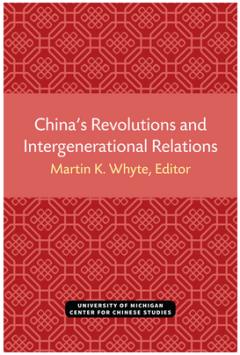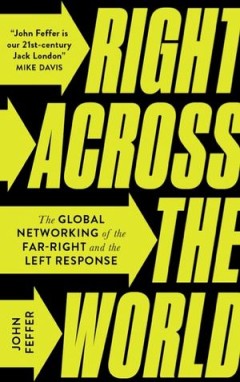Filter by

China’s Revolutions and Intergenerational Relations
China’s Revolutions and Intergenerational Relations counters the widely accepted notion that traditional family patterns are weakened by forces such as economic
- Edition
- -
- ISBN/ISSN
- 9780472901500
- Collation
- -
- Series Title
- -
- Call Number
- 320

Right Across the World: The Global Networking of the Far-Right and the Left R…
In a post-Trump world, the right is still very much in power. Significantly more than half the world’s population currently lives under some form of right-wing populist or authoritarian rule. Today’s autocrats are, at first glance, a diverse band of brothers. But religious, economic, social and environmental differences aside, there is one thing that unites them - their hatred of the libera…
- Edition
- -
- ISBN/ISSN
- 9781786808554
- Collation
- -
- Series Title
- -
- Call Number
- 320 LEF r

Feminist Solutions for Ending War
War is a man’s game,’ or so goes the saying. Whether this is true or not, patriarchal capitalism is certainly one of the driving forces behind war in the modern era. So can we end war with feminism? This book argues that this is possible, and is in fact already happening. Each chapter provides a solution to war using innovative examples of how feminist and queer theory and practice inform p…
- Edition
- -
- ISBN/ISSN
- 9780745342900
- Collation
- -
- Series Title
- -
- Call Number
- 320 FEM f

Disaster Anarchy: Mutual Aid and Radical Action
Grounded in historical debates about money, Anitra Nelson draws on a spectrum of political and economic thought and activism, including feminism, ecoanarchism, degrowth, permaculture, autonomism, Marxism and ecosocialism. Looking to Indigenous rights activism and the defence of commons, an international network of activists engaged in a fight for a money-free society emerges.
- Edition
- -
- ISBN/ISSN
- 9781786807922
- Collation
- -
- Series Title
- -
- Call Number
- 320 FIR d

Women and the UN: A New History of Women's International Human Rights
This book provides a critical history of influential women in the United Nations and seeks to inspire empowerment with role models from bygone eras. The women whose voices this book presents helped shape UN conventions, declarations, and policies with relevance to the international human rights of women throughout the world today. From the founding of the UN and the Latin American feminist m…
- Edition
- -
- ISBN/ISSN
- 9780367478230
- Collation
- -
- Series Title
- -
- Call Number
- -

Democracy and Fake News: Information Manipulation and Post-Truth Politics
This book explores the challenges that disinformation, fake news, and post-truth politics pose to democracy from a multidisciplinary perspective. The authors analyse and interpret how the use of technology and social media as well as the emergence of new political narratives has been progressively changing the information landscape, undermining some of the pillars of democracy.The volume sheds …
- Edition
- -
- ISBN/ISSN
- 9781000286731
- Collation
- -
- Series Title
- -
- Call Number
- -

Europe under Pressure: The Development of the European Union under the Influe…
The past years were characterized by a massive influx of migrants crossing the Union's external borders seeking asylum. Illegal migration, exploitation of social welfare systems, foreign infiltration and the instrumentalization of religion condensed in terror attacks determine today's changed attitude towards foreigners, refugees and migrants and therefore strongly impact the current European p…
- Edition
- -
- ISBN/ISSN
- 9783828866881
- Collation
- -
- Series Title
- -
- Call Number
- -

The Distinction of Peace: A Social Analysis of Peacebuilding
Peacebuilding serves as a catch-all term to describe efforts by an array of international organizations, non-governmental organizations, and even agencies of foreign states to restore or construct a peaceful society in the wake— or even in the midst— of conflict. Despite this variety, practitioners consider themselves members of a global profession. In this study, Catherine Goetze investiga…
- Edition
- -
- ISBN/ISSN
- 9780472073412
- Collation
- -
- Series Title
- -
- Call Number
- -

Imperial Overstretch: Germany in Soviet Policy from Stalin to Gorbachev: An A…
The book is an analysis of the rise and fall of the Soviet empire in what, during the Cold War, was called ‘Eastern Europe'. Its central focus is the role played by the German problem in that process.
- Edition
- -
- ISBN/ISSN
- 9783848724529
- Collation
- -
- Series Title
- -
- Call Number
- -

European Union - The Second Founding: The Changing Rationale of European Inte…
The author is presenting a broadly structured study about the first fifty years of European integration, its geopolitical context and academic reflection. His study is based on the two-fold thesis that since a few years, the European Union is going through a process of its Second Founding while simultaneously changing its rationale.
- Edition
- -
- ISBN/ISSN
- 9783832935023
- Collation
- -
- Series Title
- -
- Call Number
- -
 Computer Science, Information & General Works
Computer Science, Information & General Works  Philosophy & Psychology
Philosophy & Psychology  Religion
Religion  Social Sciences
Social Sciences  Language
Language  Pure Science
Pure Science  Applied Sciences
Applied Sciences  Art & Recreation
Art & Recreation  Literature
Literature  History & Geography
History & Geography